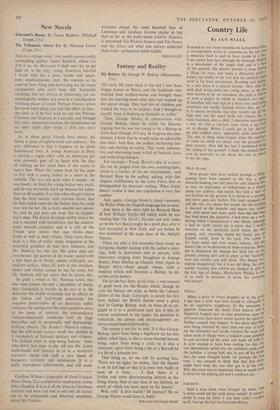New Novels
Giovanni's Room. By James Baldwin. (Michael Joseph, 15s.) The Volcanoes Above Us. By Norman Lewis. (Cape, 15s.) Tuts is a vintage week : two novels possess really outstanding quality. James Baldwin, whose Go Tell it on the Mountain I shall now try to get hold of, is the only young American novelist I know who has a pure, simple and appar- ently unselfconscious style. He reminds us by contrast how tiring and distracting are his many compatriots who can't keep still, fictionally speaking, but are always as knowingly yet un- meaningfully restless as a man in a rocking-chair .• whittling pieces of wood. Perhaps France, where his novel takes place, has had this effect on him : one feels as if he had read no one but Prevost, Constant and Madame de Lafayette, and through this calm, uninsistent medium the dreadfulness of his story really does strike a chill into one's heart.
As in those great French love stories the theme is quite straightforward and ordinary : the only difference is that it happens to be about homosexual love. A young American in Paris is having a vague affair with an American girl who presently goes off to Spain with the idea of making up her mind there if she wants to marry him. When she comes back he has gone to live with a young Italian in a room in the suburbs. This was not quite what it sounds : he was lonely; he liked the young Italian very much, and he was extremely hard up because his father had cut off supplies. It is only when the girl returns that the hero realises, with extreme terror, that he feels much more for .the Italian than he could ever feel for her. He is fairly sensible not roman- tic, and he just does not want this to happen; but it does. The drama develops swiftly and at the end is touched with melodrama, but the achieve- ment remains complete and it is still of the French love stories that one thinks—their faults as well as their virtues. Their main draw- back is a hint of rather soapy stagnation in the mournful grandeur of their love tableaux, and Mr. Baldwin has this too. His prose does not reverberate; tbe queries of the reader sound with a dull thud on its firmly, almost artificially, un- resilient surface. After all, even in this situation, choice and vitality cannot be too far away, but Mr. Baldwin will not admit that he knows this. So good a writer is Mr. Norman Lewis that one soon knows, beyond a possibility of doubt, that Guatemala is exactly as he says it is. He describes the recent revolution and its effects on the Indian and half-breed population; the macabre preparations of an American coffee company for taking over the more primitive areas in the name of tourism; the extraordinary volcano-dominated landscape with its huge butterflies and its perpetually and depressingly brilliant climate. The Reader's Digest is culture, but the half-breed ladinos insult one another in a vocabulary of fantastic delicacy and richness. The Indians want to stop being Indians : those who don't, just want to die. All this Mr. Lewis understands and conveys to us in a masterful narrative sweep and with a nice blend of humanity, cynicism and admiration. It is a really triumphant achievement, and will make Geoffrey Willans's biography of Peter Ustinoi) • (Peter Owen, 21s.) is deplorably inadequate, writes John Chandos. It is as if all the jokes in Christmas crackers had been laid end to end and all turned out to be eviscerated and bleached anecdotes about Mr. L/stinov. everyone except the most besotted fans of Lawrence and Graham Greene realise at last that so far as the truth- about Central America is concerned The Plumed Serpent and The Power and the Glory are what one always suspected them to be—pretentious fiddle-faddle.
JOHN BAYLEY


































 Previous page
Previous page